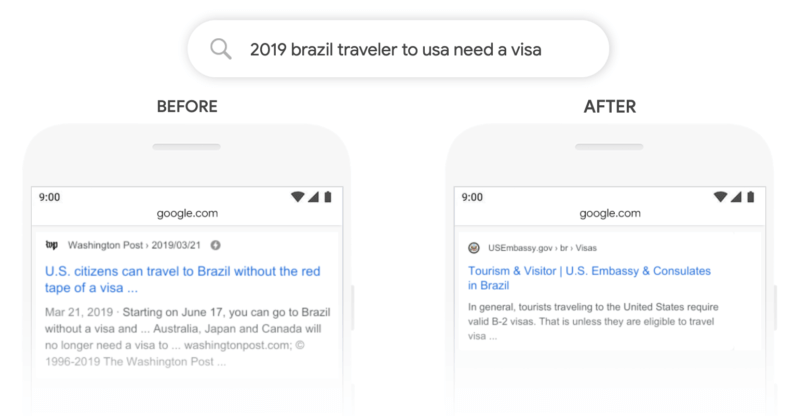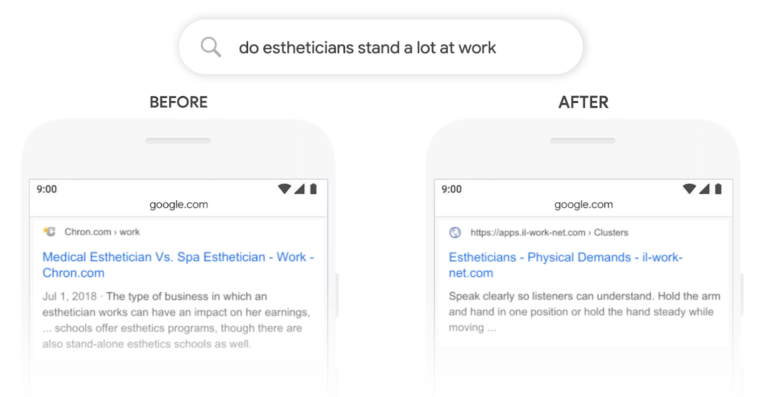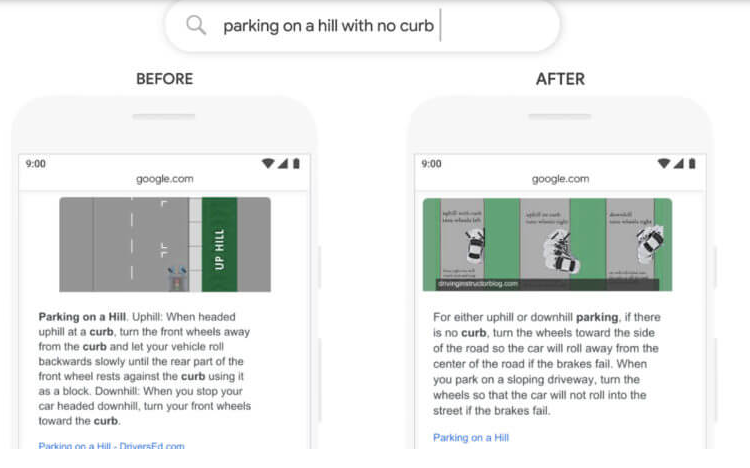Google rolled out another algorithm update that is expected to impact 10% of all search queries. This is the biggest change to Google’s algorithm in ~5 years (RankBrain). The purpose of this algorithm update is to better understand natural language in search, intended to deliver better search results.
The update is expected to roll out the week of October 21, 2019 and will be fully released in a short period of time. The update will affect English queries and will later expand into other languages.
What is BERT?
BERT is Google’s neural network-based technique for natural language processing (NLP) pre-training. This means that BERT is intended to help computers understand the nuances of language like humans do. For more information on the details of BERT, check out this resource from Dawn Anderson.
How Does BERT Impact SERPs?
Google shared an example search for “2019 Brazil traveler to Usa need a visa,” and explained that the word “to” in the query is important to understand the meaning of the query.
Pre-BERT, Google would have returned results for U.S. citizens traveling to Brazil. Now, BERT understands the importance of the word “to” within the query and will return results that actually help the user.

Image courtesy Google.
A better example is with the query “do estheticians stand a lot at work,” where Google stated that their algorithm previously would have matched the term “stand-alone” with “stand” in the query, which changes the meaning of the query and yields different search results.
With BERT, Google’s algorithm can understand that “stand” in the query is referring to the physical act of standing on the job and will display more useful results.

Image courtesy Google.
(For more examples, check out this post from Search Engine Land).
BERT’s Impact on Featured Snippets
Google shared an example of how BERT can positively impact featured snippet results by understanding the actual meaning of the query. In the example that they shared, the query “parking on a hill with no curb” would previously focus on the word curb more than the phrase “no curb,” which altered the results. Now, Google can understand the true meaning of the query and return more relevant results!

Image courtesy Google.
(For more examples, check out this post from Search Engine Land).
Optimizing for BERT
Google says you can’t really optimize for BERT, but should focus your efforts on people (sound familiar?). Again, BERT is used for Google to better understand natural language in search, so write and optimize your content for people. So while this may not require a large shift in your SEO strategy, there is now even more reason to shift your focus to people.
Interested in Seer’s approach to people? Hit us up!
Impact of BERT on Your Site
BERT will either stop showing your content if it isn’t the right fit for the query or it will start showing your content if it IS the right fit for the query. Either way, I’d say this is a good thing.
If Your Content Stops Showing
If your content doesn't appear for those long-tail queries following this update, it may seem like a bad thing. Traffic will most likely dip for the pages that were ranking, right? However, the algorithm is getting smarter and your content most likely wasn’t best suited for those specific queries, which is a good thing! You may see less traffic to those pages, but you should see higher engagement and higher conversion rates or even assisted conversions (depending on the goal of your content).
If Your Content Starts Showing
This means Google is finally recognizing the value in your content! You will most likely notice higher traffic and hopefully better engagement and more revenue attributed to whichever pages are being impacted by BERT.
3 Ways to Check How BERT Impacts You or Your Client
1. Featured Snippet Reports
At this point, most SEOs have figured out a way to identify if we own a featured snippet or not. Through using SEO tools such as Ahrefs, STAT, SEMrush, and more, you can identify which queries trigger a featured snippet and if your site owns it (or which site does own it if it’s not yours).
2. Improved Rankings
From what I can tell, BERT is most likely going to impact long-tail queries, so by tracking long-tail queries you will most likely be able to see how your site is performing with this update. You may not own the featured snippets, but breaking onto the first page for long-tail queries that are relevant to your business is huge to gain qualified traffic and drive revenue from the organic channel. However you track keyword performance, be sure to include long-tail queries in your tracker to monitor their performance. You may even find opportunities to enhance your content to take over those features snippets.
3. Improved User Behavior
Maybe your number of ranking keywords won’t change much. Maybe your traffic will remain the same. Either way, check how users engage with your site. You may be ranking for the same number of queries and driving the same amount of traffic, but your site could now be ranking for more relevant queries and driving more qualified traffic to the site. Once you identify this trend, you can use the two methods above to see which is happening (or both).
Stay Up To Date With Seer
Whether you’re looking to keep up to date on algorithm changes, brush up on your SEO skills, learn more about how search can drive revenue to your site, or really anything digital marketing related, subscribe to the Seer blog!


